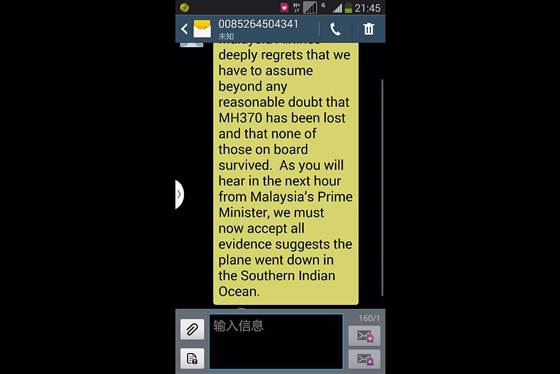
China families received this text message from Malaysia Airlines: “We deeply regret that we have to assume beyond any reasonable doubt that MH370 has been lost and that none of those on board have survived. As you will hear in the next hour, from Malaysia’s Prime Minister, we must now accept all evidence suggests the plane went down in the Southern Indian Ocean.”
By Brian Alexander
Since the disappearance of a Malaysia Airlines jet more than two weeks ago, passengers’ relatives — and much of the planet — have been gripped by uncertainty about the fate of those aboard, whipsawed by conflicting reports and speculation.
On Monday, some received stunning news via text message: Malaysia Airlines told the relatives that the plane “has been lost and that none of those on board have survived.”
It was a shocking moment — perhaps even more so for the way it was delivered. Malaysia Airlines said it informed “the majority of the families” in person and by phone. But experts in disaster response and grief questioned the humanity of the text-message notification.
Told of the text, Karla Vermeulen, a professor of psychology and the assistant director of the Institute for Disaster Mental Health at the State University of New York at New Paltz, exclaimed “Oh, wow.”
“That strikes me as efficient, but very inappropriate,” Vermeulen said. “To break that big a piece of news, that devastating, by text seems pretty tone deaf and insensitive.”
A text message, she explained, is incapable of communicating emotion no matter what words are used in the text. Human beings have evolved to sense and communicate emotion with our faces, primarily our eyes. Research has shown that texting is no substitute.
That’s one reason why, for example, the military notifies families of a loved one’s death in person. In an airline disaster in the U.S., relatives typically get personal attention from an airline employee, Red Cross volunteer or other official. Some airlines run drills for such an eventuality.
Even though this bad news was hardly unexpected, Vermeulen said, “People will have strong reactions. They fall down, they cry. To do this in a vacuum, staring at the phone, with no personal support there seems like a secondary trauma.”
Other experts pointed out that some families may have told authorities that they wished to receive news via text. Both Merritt Schreiber, the director of psychological programs for the University of California Irvine’s Center for Disaster Medical Services, and Robin Goodman, a psychologist with A Caring Hand bereavement services in New York City, explained that it’s not uncommon for survivors to pre-authorize such communications, partly because it allows families to learn news before reading or hearing it in mass media.
“And the complexity of this situation is kind of unique,” Schreiber added.
That’s one reason why, for example, the military notifies families of a loved one’s death in person. In an airline disaster in the U.S., relatives typically get personal attention from an airline employee, Red Cross volunteer or other official. Some airlines run drills for such an eventuality.
Even though this bad news was hardly unexpected, Vermeulen said, “People will have strong reactions. They fall down, they cry. To do this in a vacuum, staring at the phone, with no personal support there seems like a secondary trauma.”
Other experts pointed out that some families may have told authorities that they wished to receive news via text. Both Merritt Schreiber, the director of psychological programs for the University of California Irvine’s Center for Disaster Medical Services, and Robin Goodman, a psychologist with A Caring Hand bereavement services in New York City, explained that it’s not uncommon for survivors to pre-authorize such communications, partly because it allows families to learn news before reading or hearing it in mass media.
“And the complexity of this situation is kind of unique,” Schreiber added.
Still, said Kenneth Doka, a professor at the College of New Rochelle and the senior consultant to the Hospice Foundation of America, despite the logistical challenges of families being in China, Malaysia and elsewhere, “I can’t think of a worse way to do it. At least they should have gotten a phone call from a person.”
Exactly how this method of notification will affect survivors in the long term is unknown. In-person compassion is always preferable, Schreiber said, but even with it, “the loss is still there.”
James Halpern, who responded to the Sandy Hook school shootings and the recent Harlem gas explosion, teared up when contacted by NBC News and told of the text message notification.
People whose loved ones are victims of disasters and tragedies experience a “shattering of fundamental assumptions about themselves and the world when they get this information that somebody you love has died in a crash or some other disaster,” Halpern said. “That kind of trauma is certainly not helped with a text message.”
Survivors have questions — many questions. How was the conclusion made? Who made it? What does it mean? Are authorities sure? What happens now? What do I do? A text leaves no opportunity to ask such questions or to vent.
This is especially important given the miscommunication surrounding MH 370. As a representative of Chinese families said in a statement released Monday, “since the disappearance, they have lied and hid the truth….”
The representative went on to accuse authorities of delays that, families believe, may have cost lives. A text does nothing to help soothe those kinds of feelings or engender trust.
On the other hand, the mere presence of another person can “offer warmth and comfort” said Halpern, director of the New Paltz institute.
“A personal touch is a first step” in recovery, Vermeulen explained. “It’s a reminder that ‘I have lost everything, yet this person is here being kind to me, talking to me, paying attention to my reactions. So the entire world is not in chaos even though my world is.'”
Courtesy: msn news

Leave a comment